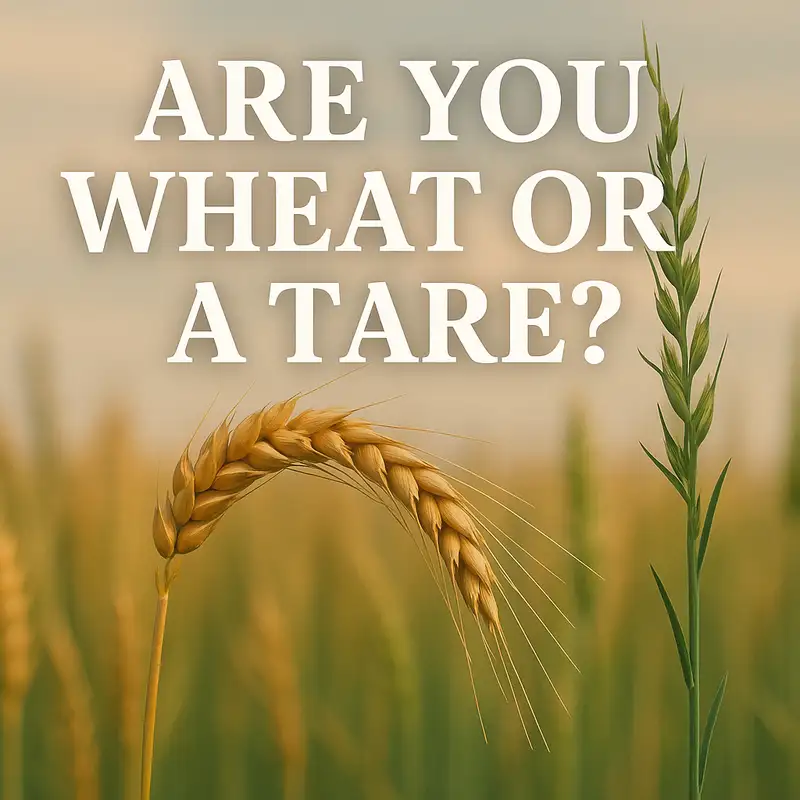Are You Wheat Or A Tare? (From our 7-20-25 Worship)
Introduction: County Fairs and the Desire to Be the Best
- County fairs highlight our competitive nature—art contests, tractor pulls, pie baking, etc.
- People naturally want to be seen as the best—even if it means faking it.
- Story of Han van Meegeren, a Dutch painter who faked 17th-century masterpieces, even deceiving Nazi officials. He was eventually exposed but only after nearly being convicted for selling national treasures.
- Point: Faking it can be dangerous—not just in art, but spiritually.
Spiritual Deception: The Parable of the Wheat and Tares (Matthew 13:24–30, 36–43, ESV)
- Jesus’ parable teaches that the Kingdom of Heaven contains both genuine and false members.
- Tares (weeds) resemble wheat early in growth, but:
- Wheat bows under the weight of grain (fruitful).
- Tares stand tall but contain poisonous seeds.
- Jesus explains:
- Good seed = sons of the kingdom.
- Weeds = sons of the evil one, sown by the devil.
- Judgment will come at harvest (end of the age).
- Main warning: Not everyone who looks like a Christian is one.
Application: What’s the Difference Between Wheat and Tares?
- Outward appearances can deceive.
- One key difference: true Christians meet physical needs to reach spiritual hearts, like Jesus did.
Jesus’ Ministry Model: Meeting Physical Needs First
Feeding the 5,000 (John 6:1–14, 25–35, ESV)
- Jesus fed people, not just to fill stomachs, but to lead them to the “bread of life.”
- He challenged them not to work for perishable food but for eternal life.
- Many rejected His spiritual teaching (John 6:66), but some believed (John 6:68–69).
The Woman at the Well (John 4:1–30, ESV)
- Jesus broke social norms by speaking to a Samaritan woman.
- He asked her for water—not because He needed it—but to acknowledge her worth and open a door to spiritual truth.
- She went from isolation to evangelism, changing her village.
Healing the Leper (Mark 1:40–42, ESV)
- Jesus touched a leper before healing him—something no one else would do.
- The touch itself met a deep emotional need for human connection.
- It showed Jesus’ compassion in action.
Everyday Evangelism: Be Like Jesus
- Jesus’ “Go” (Matthew 28:18–20) means as you go—in daily life, on errands, at work.
- Like the Good Samaritan, opportunities come in everyday life.
- Be ready to meet physical needs to open doors for spiritual conversation.
Final Thoughts and Encouragement
- Don’t let fear or inconvenience stop you from serving.
- You may never get another chance with that person.
- Even a small act—like a kind word, a meal, a ride, or a touch—can lead to a changed eternity.
Scriptural Charge
- James 2:14–17 (ESV): "What good is it, my brothers, if someone says he has faith but does not have works?... Faith by itself, if it does not have works, is dead."
- Ephesians 2:10 (ESV): "For we are his workmanship, created in Christ Jesus for good works, which God prepared beforehand, that we should walk in them."
Invitation
- If you have a physical or spiritual need, come.
- God loves you. His people love you.
- Let us help—whether with a kind word, a prayer, or an act of service.

